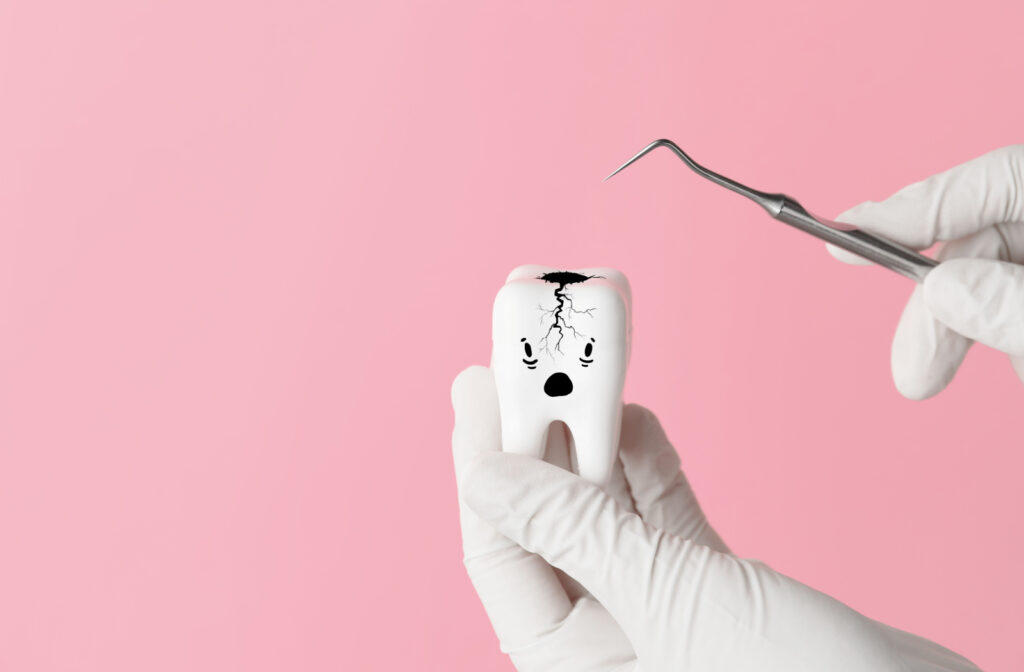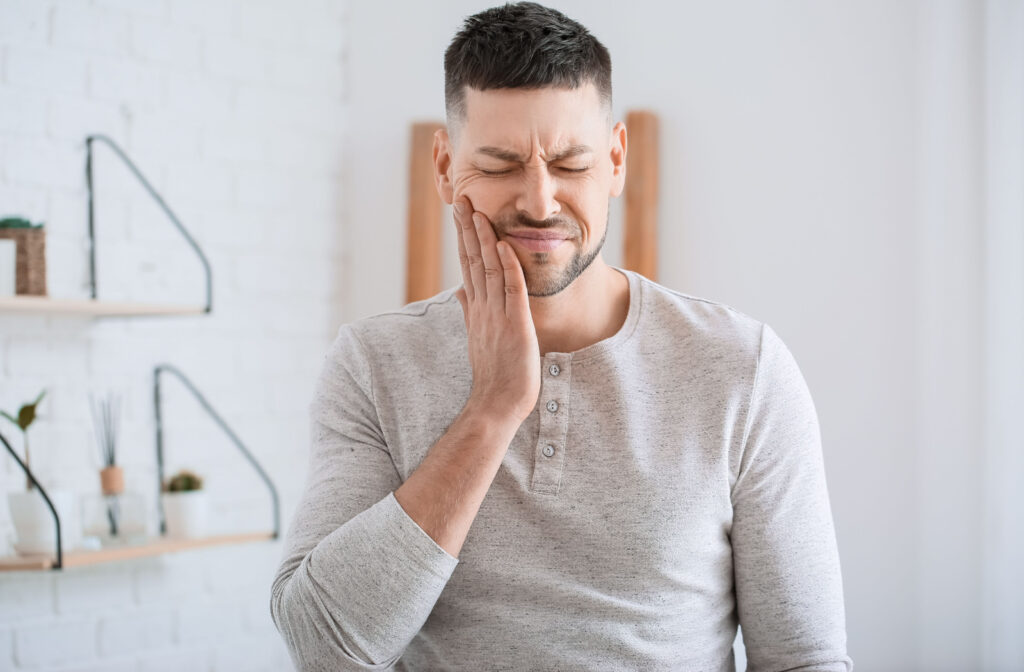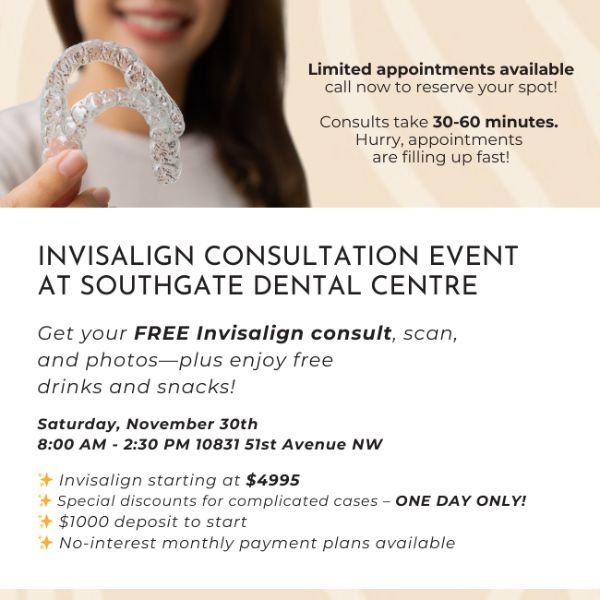If you ever experience sudden tooth pain, you might wonder whether it could be a dental emergency or if it’s just tooth sensitivity. Sudden pain can be alarming, so what’s causing this feeling?
10 reasons why you might be experiencing unexpected tooth pain include:
- Tooth sensitivity
- Cavities
- Sinus infections
- A damaged tooth
- Gum disease
- An impacted tooth
- Teeth grinding (bruxism)
- TMJ
- Tooth infection
- Cracked tooth
If you have sudden tooth pain and it’s after our clinic hours, you can call our phone number and talk to a dentist 24/7.
Tooth Sensitivity
Tooth sensitivity is an extremely common issue. It develops when the enamel—the protective outer surface of the tooth—erodes or wears down over time. This exposes the layer underneath, the dentin, which can be much more sensitive.
Then, when exposed to extreme temperatures, this dentin can be triggered. It sends nerve signals to the brain that something is wrong, which often feels like a shooting pain. If you only experience pain when exposed to particularly hot or cold foods, it may just be tooth sensitivity, which can also follow recent dental treatment.
During dental fillings, the tooth is traumatized creating inflammation, and typically the filling conducts thermal changes to the nerve leading to teeth sensitivity. If tooth sensitivity is severe or long-lasting, please do not ignore it and seek dental help.
Cavities
Cavities, also known as tooth decay or dental caries, are an extremely common problem. They develop when the bacteria in your mouth produce acids that attack the tooth enamel. Over time, the acids can create a hole in the enamel, which can progress through to the dentin and makes a gap where more bacteria can begin to multiply.
Without treatment, this process can delve further and further into your teeth. If untreated, cavities can lead to:
- Discomfort
- Infection
- Tooth loss
It can help to visually inspect your teeth if you think you may have a cavity. Look for small, visible dark spots where you’re feeling pain. If you notice these, visit your dentist to discuss potential treatment.
Sinus Infections
Throughout your head, you have several air-filled spaces. They’re located behind the forehead, nasal bones, cheeks, and eyes. These are your sinuses.
Typically the sinuses that run in the top posterior are the ones that run extremely close to your teeth. And when they become inflamed or infected in any way, they start to swell and put pressure on the surrounding root structures. This can often be mistaken for tooth pain.
If you’re noticing other sinus infection symptoms, like a headache, stuffy nose, or congestion, your tooth pain may be just a result of this infection.
The reverse is also true. If you have a tooth infection in the upper posterior, it may contribute to sinus problems. So diagnosing whether or not it’s a sinus infection causing tooth pain, or tooth infection causing sinus pain needs to be determined.
A Damaged Tooth
Accidents happen, and if you damage one of your teeth in any way, you are bound to feel some pain. Pain that resolves itself is usually of short duration and induced by cold can go away on its own. Pain that’s spontaneous, of long-duration, and severe usually won’t go away on its own and will need interceptive therapy.
It can be hard to tell how severe the damage is without an x-ray from your dentist. If you’ve recently experienced any type of trauma to your face, eaten any too-hard foods, or can see any visible damage to a tooth, seek medical attention from your dentist to avoid further complications.
Gum Disease
Gum disease, particularly gingivitis, develops when the bacteria in your mouth start attacking the soft tissue around your teeth. It’s usually easy to ignore in its early stages because it may not cause pain or discomfort.
But as gum disease progresses and more bacteria accumulate, you might experience periodontitis:
- Gum redness
- Gum or tooth tenderness
- Bleeding gums
- Swollen gums
- Bad breath
- Bad taste in the mouth
It often causes inflammation in the gums, which can begin to radiate to the surrounding teeth. Practicing proper oral hygiene is essential to avoid conditions like gum disease. Make sure you are brushing your teeth 2 times a day for 2 minutes at a time, and remember to floss and use mouthwash regularly! If you think you may have gum disease, visit your dentist for a checkup.
An Impacted Tooth
When a tooth doesn’t fully emerge from the gums, it’s called “impacted.” This tooth can continue to grow and push against the surrounding teeth, leading to discomfort and pain, and even destruction of the adjacent tooth. Wisdom teeth are notorious for becoming impacted, which is why they’re often removed.
If you experience sudden tooth pain in your back molars or notice any shifting or crowding of your teeth as an adult, it could be a result of an impacted tooth.
Tooth Grinding
Tooth grinding, also called bruxism, is a condition where you grind or clench your teeth, often during sleep. Many people subconsciously do this as a result of stress or anxiety, while others may do it simply due to a misalignment with their bite.
Over time, this can lead to wear of the biting surfaces of teeth, which can create tooth pain, sensitivity, as well as, jaw pain. You might not even notice you are doing this until a dentist checks your teeth, but the enamel can wear down and lead to further issues if you don’t address it. It may help to use a mouthguard while you sleep and do what you can to manage your stress levels.
Tooth Infection
If you’ve ever had a tooth that’s been traumatized by a baseball or hockey puck, or even a large filling or crown, the pulp tissues can become necrotic (dead). A tooth that has been injured can lead to a “dead tooth.” When the interior of the tooth becomes dead, it starts to rot.
Teeth that become necrotic (dead), can then become infected weeks, months, or years later. A toothache is created by the infection, creating pressure on the interior of the tooth onto the fragile nerve endings.
The swelling can lead to the tooth sitting higher in your bite, which makes it painful to bite on. The pain is typically intense and of long duration. Some patients find swishing cold water in their mouth helps it feel better.
Treatment is extraction or root canal therapy.
TMJ
The temporomandibular joint is the hinge-like joint on both sides where your jaw connects to the rest of your skull. Several muscles and nerves associated with this joint run just underneath your teeth. Sometimes the pain in your joint can lead you to think it’s tooth pain, when really it’s TMJ or TMD.
However, it is important to note that while TMJ can cause pain and irritation in the area, it rarely affects the teeth themselves. There are other symptoms you can keep an eye out for to determine if your pain is coming from the tooth or if it could be TMJ:
- Jaw joint pain or tenderness
- Audible clicking or popping noises when opening or closing the mouth
- Locking of the jaw, making it difficult to open or close
- Headaches or earaches, often associated with the discomfort originating from the TMJ area
If you experience any of these symptoms, visit your dentist as soon as possible for a proper diagnosis and treatment.

Cracked Tooth
A cracked tooth often happens to people who grind or clench their teeth. Typically these are teeth with fillings, but it can also happen to untreated teeth. The fracture typically propagates vertically into the nerve, which causes acute pain and will eventually lead to infection of the pulp chamber.
Treatment is adjusting the bite and root canal therapy, followed by a protective restoration (usually a crown).
What to Do if You Have Unexpected Tooth Pain
If you have any sudden pain or discomfort in your mouth, don’t ignore it. Instead, visit our team here at Southgate Dental Centre. We can perform a thorough consultation to determine what’s causing your discomfort and provide treatment as necessary. Don’t suffer in silence—request an appointment with us today!
If you have sudden tooth pain and it’s after our clinic hours, you can call our phone number and talk to a dentist 24/7.



